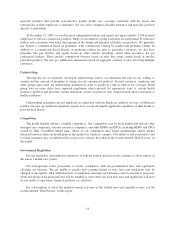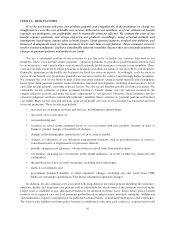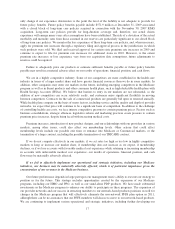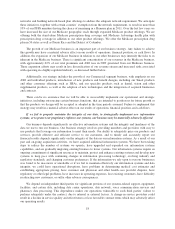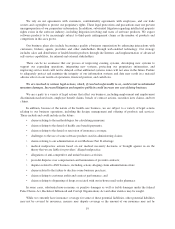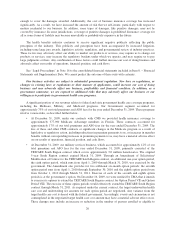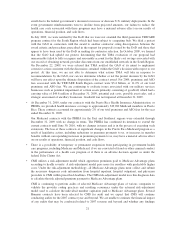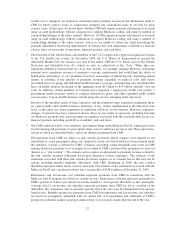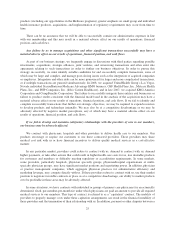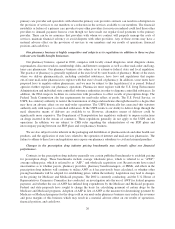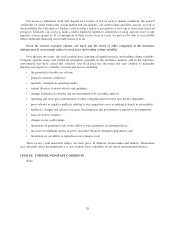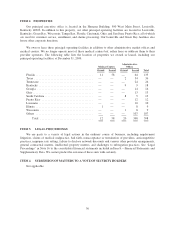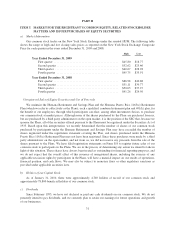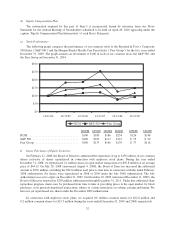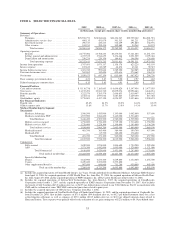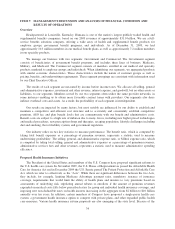Humana 2009 Annual Report Download - page 34
Download and view the complete annual report
Please find page 34 of the 2009 Humana annual report below. You can navigate through the pages in the report by either clicking on the pages listed below, or by using the keyword search tool below to find specific information within the annual report.and Human Services in those instances where the unauthorized activity poses a significant risk of financial,
reputational or other harm to the individuals, and to notify the media in any states where 500 or more people are
impacted by any unauthorized release or use of or access to PHI. ARRA also requires business associates to
comply with certain HIPAA provisions. ARRA also establishes higher civil and criminal penalties for covered
entities and business associates who fail to comply with HIPAA’s provisions and requires the U.S. Department of
Health and Human Services to issue regulations implementing its privacy and security enhancements. We will
continue to assess the impact of these regulations on us as they are issued.
State Regulation
Laws in each of the states (and Puerto Rico) in which we operate our HMOs, PPOs and other health
insurance-related services regulate our operations including: licensing requirements, policy language describing
benefits, mandated benefits and processes, entry, withdrawal or re-entry into a state or market, rate formulas,
delivery systems, utilization review procedures, quality assurance, complaint systems, enrollment requirements,
claim payments, marketing, and advertising. The HMO, PPO, and other health insurance-related products we
offer are sold under licenses issued by the applicable insurance regulators.
Our licensed subsidiaries are also subject to regulation under state insurance holding company and Puerto
Rico regulations. These regulations generally require, among other things, prior approval and/or notice of new
products, rates, benefit changes, and certain material transactions, including dividend payments, purchases or
sales of assets, intercompany agreements, and the filing of various financial and operational reports.
Certain of our subsidiaries operate in states that regulate the payment of dividends, loans, or other cash
transfers to Humana Inc., our parent company, and require minimum levels of equity as well as limit investments
to approved securities. The amount of dividends that may be paid to Humana Inc. by these subsidiaries, without
prior approval by state regulatory authorities, is limited based on the entity’s level of statutory income and
statutory capital and surplus. In most states, prior notification is provided before paying a dividend even if
approval is not required.
Although minimum required levels of equity are largely based on premium volume, product mix, and the
quality of assets held, minimum requirements can vary significantly at the state level. Based on the statutory
financial statements as of December 31, 2009, we maintained aggregate statutory capital and surplus of $3.6
billion in our state regulated subsidiaries, $1.2 billion above the aggregate $2.4 billion in applicable statutory
requirements which would trigger any regulatory action by the respective states.
Other Investigations
We are also subject to various governmental audits and investigations. Under state laws, our HMOs and
health insurance companies are audited by state departments of insurance for financial and contractual
compliance. Our HMOs are audited for compliance with health services by state departments of health. Audits
and investigations are also conducted by state attorneys general, CMS, the Office of the Inspector General of
Health and Human Services, the Office of Personnel Management, the Department of Justice, the Department of
Labor, and the Defense Contract Audit Agency. All of these activities could result in the loss of licensure or the
right to participate in various programs, including a limitation on our ability to market or sell products, the
imposition of fines, penalties and other civil and criminal sanctions, or changes in our business practices. In
addition, disclosure of any adverse investigation or audit results or sanctions could negatively affect our industry
or our reputation in various markets and make it more difficult for us to sell our products and services.
Any failure to manage administrative costs could hamper profitability.
The level of our administrative expenses impacts our profitability. While we proactively attempt to
effectively manage such expenses, increases or decreases in staff-related expenses, additional investment in new
24


